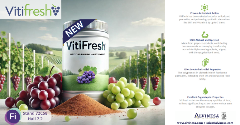News
Ground cinnamon’s lead levels trigger FDA call for more stringent testing
28 Mar 2024Following the discovery of elevated lead levels in ground cinnamon, the US Food and Drug Administration (FDA) has asked cinnamon processers to be more vigilant about testing to ensure that supplies of the spice comply with health and safety regulations.
Earlier this month, the FDA sent a letter to cinnamon processors throughout the US, highlighting six manufacturers found to be supplying ground cinnamon with elevated levels of lead.

The FDA says that ground cinnamon supplied by La Fiesta Food, Moran Foods, MTCI, Raja Foods and Greenbar International were found to have lead concentrations of between 2.03 and 3.4 parts per million (ppm) following tests conducted in various States across the nation using the Laboratory Flexible Funding Model.
The organisation is recommending that cinnamon processors refer to Part IV of FDA's compliance program 7304.019, "Toxic Elements in Food & Foodware and Radionuclides in Food - Import and Domestic" for methodologies used by FDA to test for lead in food products.
“Some precautions manufacturers can take to help prevent unsafe levels of lead in food include ensuring their equipment is not contributing to lead in a product – for example, ensuring they are not using non-food grade equipment containing lead - choosing sources of food or food ingredients with lower lead levels or no detectable lead, following Good Agricultural Practices to mitigate uptake of lead during growing, using cleaning methods to minimize contributions from soil and the environment, and systematically testing food for lead and other heavy metals,” said Laura Niles, FDA health communications specialist.
Six distributors asked to recall ground cinnamon
“Based on results from these analyses, FDA is recommending recalls of ground cinnamon from six distributors whose products had the lead levels noted. FDA is recommending recall of these products because prolonged exposure may be unsafe,” the letter states.
According to the FDA, all the companies involved in the recall are working with the organisation to voluntarily recall the products, with the exception of MTCI which has not yet responded to the FDA’s request. Niles noted that the FDA has subsequently learned that MTCI had gone out of business.
“Food growers, manufacturers, importers, and retailers share a responsibility for ensuring the safety of the foods that reach store shelves,” said Jim Jones, deputy commissioner for human foods at the FDA.
“The levels of lead we found in some ground cinnamon products are too high and we must do better to protect those most vulnerable to the negative health outcomes of exposure to elevated levels of lead.”
An emphasis on chemical hazard prevention
The FDA wants manufacturers, distributors, and processors to follow the requirements for risk and hazard prevention for human foods, with particular attention to testing for chemical hazards that could be present in products bound for retailer’s shelves.
The FDA also said it would continue to conduct testing and says it will request the removal of any cinnamon products, should they prove to be unsafe.
The FDA did not respond to questions from Ingredients Network about the recall but did state that it was continuing to stress the importance of its Closer to Zero initiative, which aims to reduce exposure to food contaminants in children.
Closer to Zero aims to protect children
This initiative has a particular emphasis on reducing potentially dangerous levels of lead, arsenic, chromium, and mercury, which are all deemed to be particularly hazardous to young children.
The FDA’s latest move comes after several incidents across the US involving around 500 consumers - mainly young children – who fell sick after consuming apple sauce pouches that had been formulated with contaminated cinnamon.
The incidents first came to light in October 2023 and involved the recall of apple and cinnamon pouches made under the Weis, Schnucks, and WanaBana brands.
This recall was significantly more serious than the current ground cinnamon recall. FDA testing showed that lead levels in the ground cinnamon used to formulate the apple sauce pouches were tested at 2,000 to 5,000ppm, compared to the 2.04 to 3.4ppm for the current recall.
Lead chromate has been used to add weight
The high levels of lead found in the apple sauce pouches caused a number of individuals to become sick almost immediately with a variety of symptoms associated with lead poisoning, including nausea, headaches, and muscle aches. The lower levels of lead found in the more recent batches of ground cinnamon are not thought to pose an immediate effect on humans but could prove risky with prolonged use.
As part of the apple sauce pouch investigation, the FDA reviewed 90 complaints from consumers, later confirming that there were elevated lead chromate levels in the cinnamon ingredient. Historically, such substances have been illegally added to cinnamon in an effort to increase the weight of the powder.
The organisation’s subsequent investigation led to the recommendation that cinnamon manufacturers and suppliers make a concerted effort to avoid such contaminants, with a further recommendation for a voluntary recall of a number of potentially contaminated food brands.
Related news

Nitrites: Pressure grows on UK to follow EU’s lead
20 Nov 2025
Pressure is growing on the UK to follow the EU’s lead after the bloc revised its regulations on the permitted levels of nitrites and nitrates in cured meats.
Read more
Predictive maintenance redefines powder mixing reliability
13 Nov 2025
Mill Powder Tech's smart control systems harness real-time data to help the food and biotech sectors achieve zero downtime and smarter output, alongside rigorous GMP standards and ambitious ESG goals.
Read more
New UPF standard hoped to offer consumers ‘coherence and clarity’
10 Nov 2025
Ingredients companies are being urged to enter “a new era of partnership and innovation” following the launch of the industry’s first non-UPF verification scheme.
Read more
Ingredient quantities mislabelled on popular protein bars, independent tests show
5 Nov 2025
Some popular protein bars contain more fat, carbs, and/or sugars than claimed on their labels, independent nutrition testing reveals.
Read more
Will postbiotics become the go-to functional ingredient?
3 Nov 2025
Postbiotics show significant promise for the functional foods market due to their safety profile and beneficial bioactive properties, research suggests.
Read more
Will Wicks’ Killer Bar harm the protein bar category?
23 Oct 2025
Joe Wicks’ deliberately dangerous protein bar is fuelling anti-UPF sentiment – but there are concerns that his messaging is misguided and could have unintended consequences.
Read more
EU citizens have high food safety awareness but cost guides purchasing
20 Oct 2025
EFSA’s 2025 Special Eurobarometer report on food safety shows shifting concerns, with cost remaining the primary factor influencing food purchasing decisions.
Read more
Food fraud risks rise as brands fight economic and environmental headwinds
10 Oct 2025
Climate change, geopolitics, regulations, and demand for sustainable products are pushing up food fraud and adulteration risks, warns a world-leading food fraud expert.
Read more
EU proposes delaying anti-deforestation rules by another year
3 Oct 2025
The European Union (EU) plans to push back the already-delayed European Union Deforestation Regulation (EUDR) by another year, citing IT problems.
Read more
Vitifresh: A clean label solution for food protection
24 Sep 2025
Vitifresh, an upcycled grape extract from Spain, offers powerful antioxidant and antimicrobial benefits, extending food shelf life naturally and supporting clean label trends.
Read more